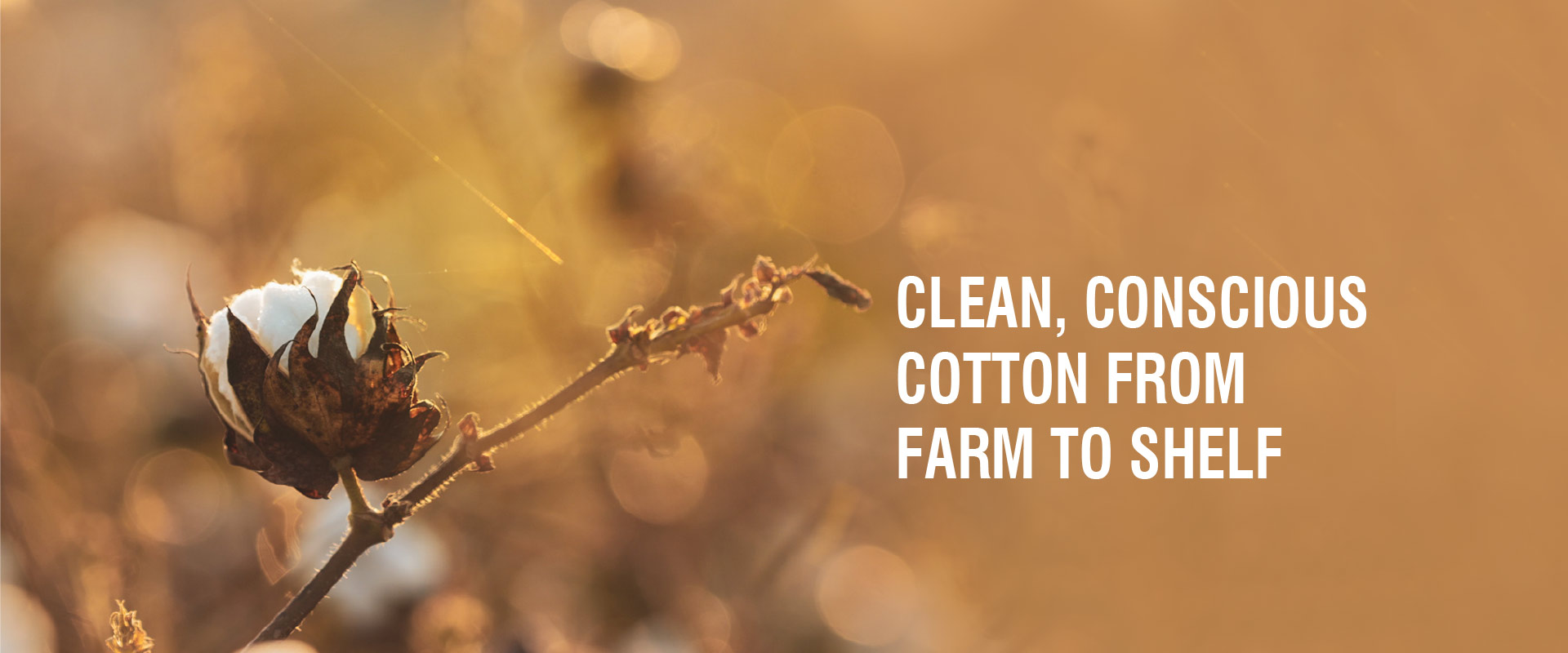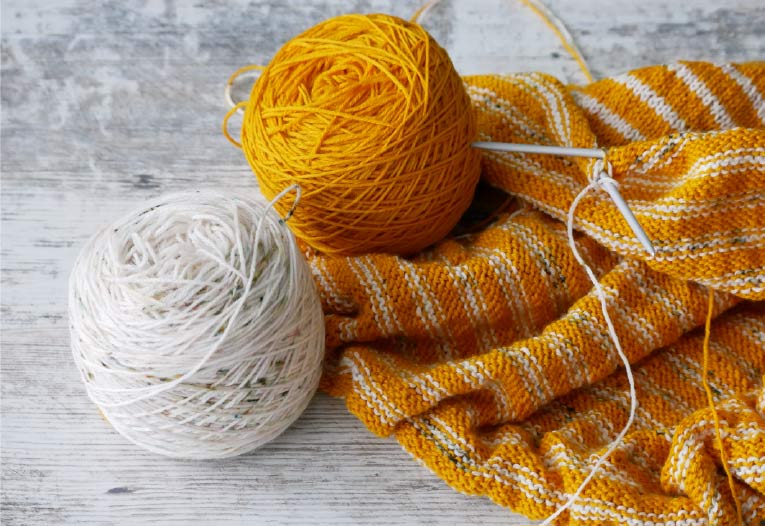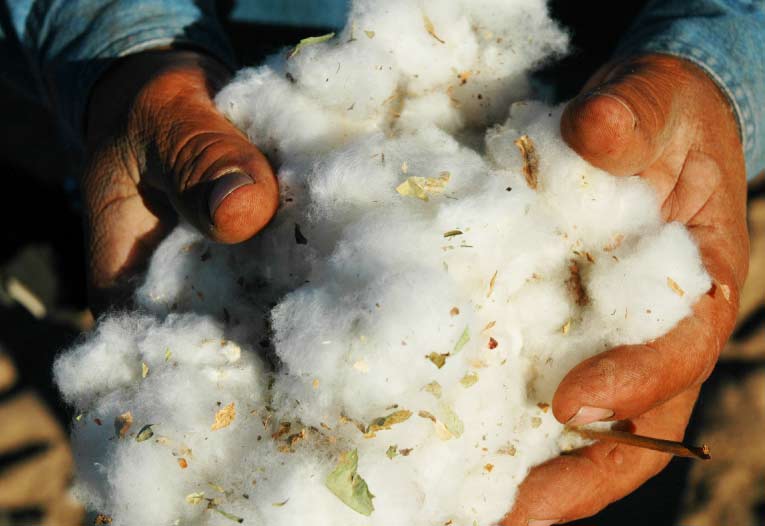
Better for the people and the planet

Better for the people and the planet
OUR STORY

Organic cotton is cotton fiber that has been grown without the use of any harmful chemical pesticides and fertilizers. The cultivation process preserves natural biodiversity, biological cycles and well-being of the crop land. It is better for the environment, for the people growing it, those who create products with it and those who consume it. To be certified as organic cotton, the end product needs to meet strict regulations.
We realise however, that a commitment to sustainably sourcing materials and creating environment friendly products involves more than just putting out pledges and stacking the required certificates. It takes dedication, determination and deliberation in turning ambitions into action. In that endeavor we have adopted the Farm-to-Shelf approach to source and secure organic cotton. This brings together consumers, retailers, creators and cultivators, to collaborate their efforts to bring about a sustainable change.

OUR STORY

Organic cotton is cotton fiber that has been grown without the use of any harmful chemical pesticides and fertilizers. The cultivation process preserves natural biodiversity, biological cycles and well-being of the crop land. It is better for the environment, for the people growing it, those who create products with it and those who consume it. To be certified as organic cotton, the end product needs to meet strict regulations.

We realise however, that a commitment to sustainably sourcing materials and creating environment friendly products involves more than just putting out pledges and stacking the required certificates. It takes dedication, determination and deliberation in turning ambitions into action. In that endeavor we have adopted the Farm-to-Shelf approach to source and secure organic cotton. This brings together consumers, retailers, creators and cultivators, to collaborate their efforts to bring about a sustainable change.
WHY CHOOSE ORGANIC COTTON?

Better for consumers
Our organic cotton yarn is spun from the top quality staple fiber that is free of any harsh chemicals, so the fabric made from the yarn is softer, stronger and will outlast conventional cotton products, making it better for your pocket too. We source our organic cotton from Maharashtra, Telengana, Gujarat and Andhra Pradesh. We source almost 20% – 25% of the total organic cotton we use.
The organic cotton we source leads to products that are safe for you and your family as it is devoid of allergenic, carcinogenic, and other toxic residue from chemicals. It is beneficial especially for people with sensitive skin, allergies and chemical sensitivities. We use this organic cotton to create products such as carded yarns, combed yarns, 20s – 40s count and made –to-order products. We also use it to create blends such as modal, polyester, recycled cotton, viscose, hemp, linen, kapok and new age viscose.
Specialty of Sulochana’s Organic Cotton:
- We engage 500 farmers with approx. 350-500 hectares of farm land with full transparency and traceability, training of farmers and other value additions.
- Our fibre is marked with luminous pigment markers, readable and traceable upto the garment with the readable technology.
- We make organic cotton yarn with traceability, testing, transparency, farmer training available at fair price to the brands.

Better for consumers
Our organic cotton yarn is spun from the top quality staple fiber that is free of any harsh chemicals, so the fabric made from the yarn is softer, stronger and will outlast conventional cotton products, making it better for your pocket too. We source our organic cotton from Maharashtra, Telengana, Gujarat and Andhra Pradesh. We source almost 20% – 25% of the total organic cotton we use.
The organic cotton we source leads to products that are safe for you and your family as it is devoid of allergenic, carcinogenic, and other toxic residue from chemicals. It is beneficial especially for people with sensitive skin, allergies and chemical sensitivities. We use this organic cotton to create products such as carded yarns, combed yarns, 20s – 40s count and made –to-order products. We also use it to create blends such as modal, polyester, recycled cotton, viscose, hemp, linen, kapok and new age viscose.
Specialty of Sulochana’s Organic Cotton:
- We engage 500 farmers with approx. 350-500 hectares of farm land with full transparency and traceability, training of farmers and other value additions.
- Our fibre is marked with luminous pigment markers, readable and traceable upto the garment with the readable technology.
- We make organic cotton yarn with traceability, testing, transparency, farmer training available at fair price to the brands.
Better for the planet
Organic cotton cultivation and use in textile and fashion consumes up to 91% less water, reduces carbon footprint by 46%, uses 62% less energy, has 72% less acidification potential and 26% eutrophication potential. The environmental benefits of organic cotton include promotion of biodiversity and carbon sequestration in soils. With the switch to organic cotton, pollution and excessive resource use can be dramatically curbed.


Better for the planet
Organic cotton cultivation and use in textile and fashion consumes up to 91% less water, reduces carbon footprint by 46%, uses 62% less energy, has 72% less acidification potential and 26% eutrophication potential. The environmental benefits of organic cotton include promotion of biodiversity and carbon sequestration in soils. With the switch to organic cotton, pollution and excessive resource use can be dramatically curbed.

Better for cultivators & manufacturers
With no toxic and carcinogenic chemicals used in the cultivation process, organic cotton is better for farmers and their families. Our business model is built on ethical trade and farmers are paid a fair price. Organic certification also extends to textile production ensuring that no environment depleting chemicals and procedures are used to manufacture the end products. The production also makes sure that workers are treated fairly and no exploitation takes place.

Better for cultivators & manufacturers
With no toxic and carcinogenic chemicals used in the cultivation process, organic cotton is better for farmers and their families. Our business model is built on ethical trade and farmers are paid a fair price. Organic certification also extends to textile production ensuring that no environment depleting chemicals and procedures are used to manufacture the end products. The production also makes sure that workers are treated fairly and no exploitation takes place.
ORGANIC COTTON: MARKERS OF AUTHENTICITY

Certification
It should be issued by a recognized certifying authority (like GOTS). The Class of Certificate, the location and information of the certifying agency, details of contents must be clearly indicated on the packaging.

Color
Organic fabric rarely comes dazzling and extremely vibrant colours. Additionally it should not be chemically bleached.

Fragrance
Organic cotton may have a musty, earthy smell, but they usually do not have any strong or artificial smell, usually associated with various chemically treated fabrics.

Price
Organic cotton products are usually priced higher than conventional cotton. If the cost seems too good to be true, it probably isn’t organic cotton.
FARM TO SHELF
Making a commitment to source ‘more sustainable cotton’ requires more than signing a pledge, setting fibre volume targets or collecting claim units or certificates. It requires turning ambition into deliberate action by adopting a transformative new approach to sourcing and securing sustainable cotton—Farm-to-Shelf.
Through Farm-to-Shelf, brands, retailers and suppliers can turn ambition into deliberate action by gaining visibility, understanding and trust directly with growers. Farm-to-Shelf translates brands, retailers and suppliers product and commercial requirements into sustainable impact from farmer to consumers.
Our Farm-to-Shelf programme brings together brands, retailers, suppliers and growers to collaborate to drive measurable and meaningful commercial and sustainable impact and integrity at scale.
SO, HOW DOES THIS WORK?

SULOCHANA FIBRE TRACER
Sulochana Fibre Tracer gives textile brands & suppliers 20/20 vision of their supply chain
at every step from raw fibre to store.
CERTIFICATION




